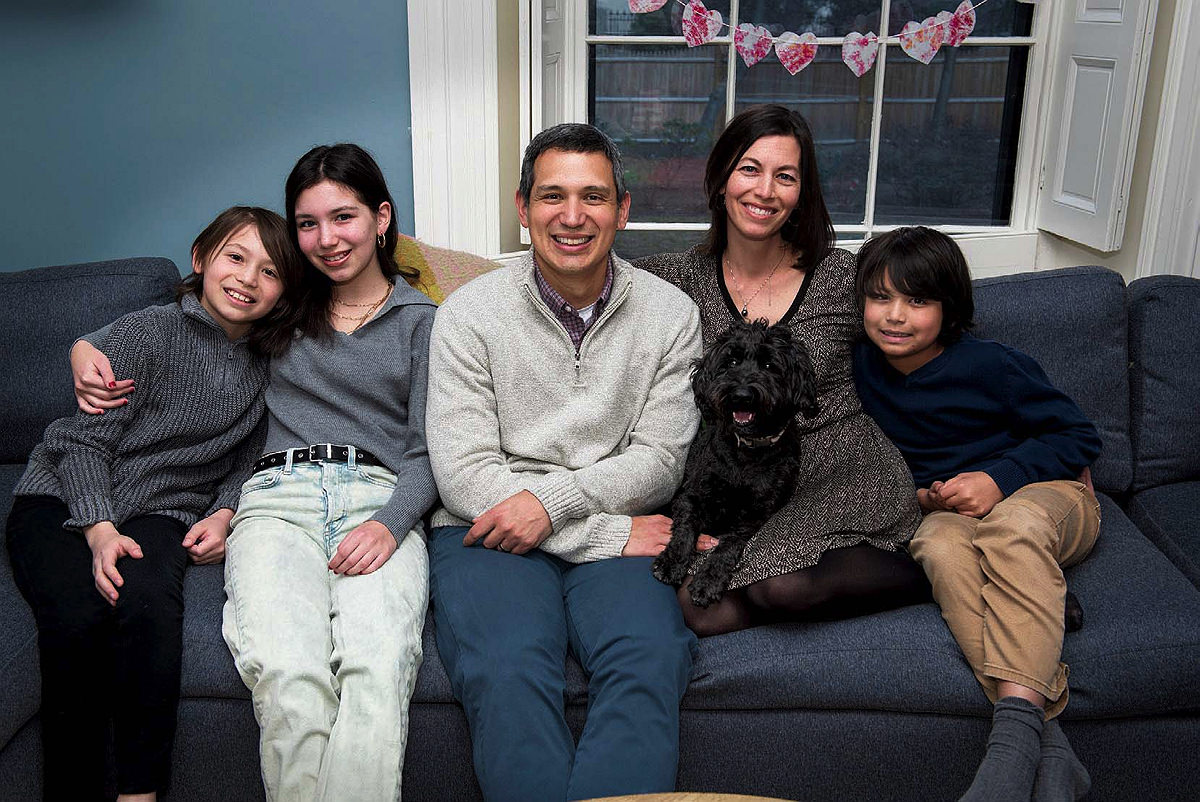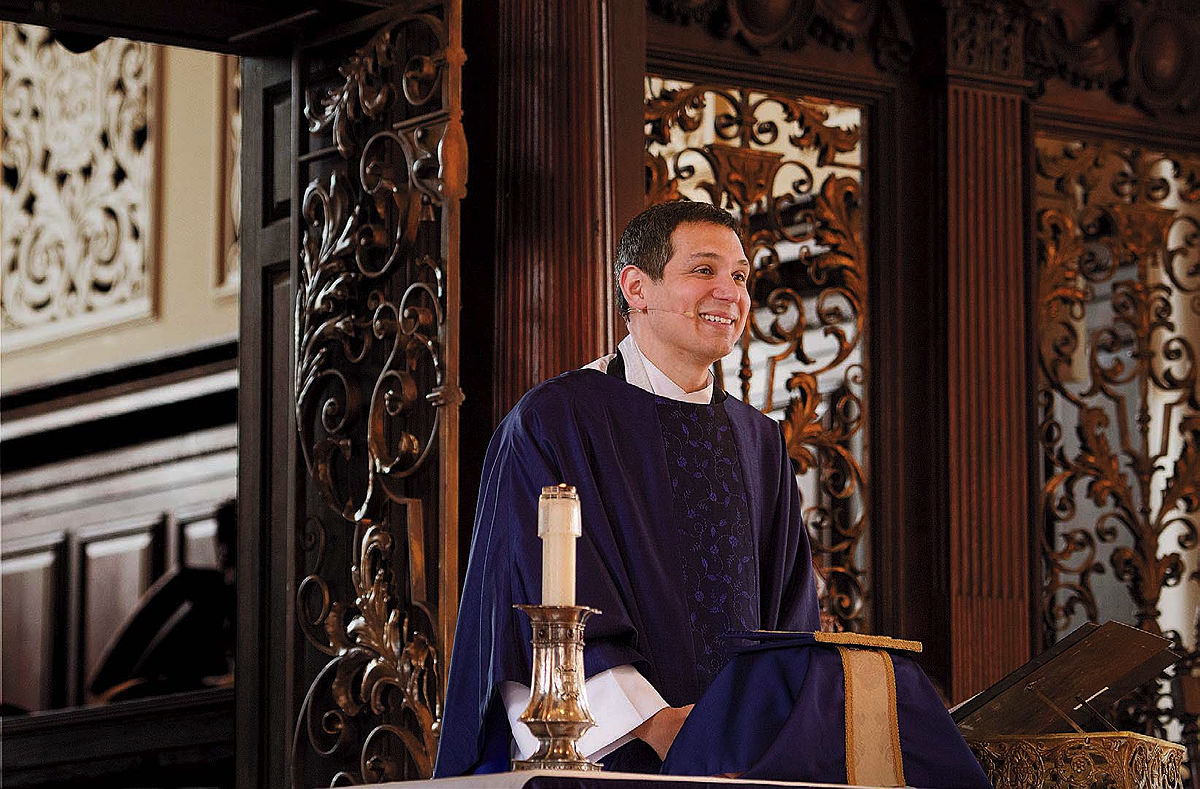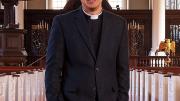Matthew Ichihashi Potts looks forward to brewing his signature pour-over coffee every morning. It’s a meditative moment—beans become grounds, still water boils, and the two steep together for precisely three minutes. It’s his morning routine, but now, as the Pusey Minister in the Memorial Church, he repeats it countless times every Thursday afternoon for the dozens of students who join him and his family in their on-campus home for food, games, and made-to-order coffee drinks at “After-School Snack.”
His extroverted wife, Colette, greets students in the Sparks House living room, while 11-year-old Sammy and nine-year-old Danny can be found playing catch and Pokémon Go in the yard or debating with law student Jacob Walker, J.D. ’24, whether the Tigers or Dodgers have a better shortstop. Meanwhile, introverted Potts and his thirteen-year-old daughter Cami make mochas, matcha, and macchiatos for students in the kitchen. Their set-up has ballooned in the past two years of hosting: pump bottles of flavored syrups, whipped cream, sprinkles, chocolate shavings, and every kind of milk alternative a twenty-first-century college student might require. These gatherings are a way for the Pottses to show the Harvard community love and offer them a home away from home. Colette even removes the family’s jackets from the coat rack so students feel as if it’s their own.
“We asked ourselves what we could offer students,” says Potts, M.Div. ’08, Ph.D. ’13, who is also Plummer professor of Christian morals. “And what we have is who we are. We’re a family. We have each other, we have a puppy, we have kids, we have space, and we have warmth and kindness.”
Sermons without Sugarcoating
But the joyful coffee maestro and father—who does a spirited impression of his family’s dog (a whoodle named Suki), is slated to coach his children’s Little League teams, and loves the Detroit Tigers despite being frequently disappointed by them—is also an Episcopal priest who questions and mourns alongside his congregation at Memorial Church.

The Potts family in Sparks House, left to right: Sammy, Cami, Matt, family dog Suki, Colette, and Danny. Suki is named for both the Japanese expression of affection and the Gilmore Girls character.
Photograph by Stu Rosner
“I don’t know what the right thing to do is,” he said in a sermon shortly after the death of Tyre Nichols at the hands of Memphis police. He spoke to the congregation, not with the affectation of a preacher in the pulpit, but with the open uncertainty of a friend sitting beside them on the couch. What was the right way to mourn Nichols? Would watching the footage of his beating sensationalize his family’s suffering, or would avoiding it mean looking away from injustice?
“The truth is, I don’t know if I really made a decision,” he confessed in the sermon. He just clicked on the video, and as he watched it, Jesus’s Beatitudes, one of his favorite parts of Scripture, ran through his head: Blessed are the poor in spirit…those who mourn…the meek…those who hunger and thirst for righteousness…the persecuted…for theirs is the kingdom of heaven. “And I have to be honest,” he said, “in the context of that video, those words seemed as thin as the paper upon which they are printed.”
“He is the minister, but he counts himself among the brokenhearted, among all of us who are trying to figure it out,” says Swartz professor of the practice of Christian studies and former interim Pusey Minister Stephanie Paulsell. He maintains a clear-eyed view of the violence in the world while believing in the mending power of Jesus’s teachings. The Beatitudes “are not overlooking or sugarcoating or rose-coloring anything,” he said in his sermon. Rather, they’re a radical call to action: God loves the marginalized, and so must everyone else. “When will we, when will this nation, love those who are beloved of God?” he asked, his voice snagging on grief. “We will not know what God’s blessing means until we do.”
His theological work is on wrenching topics: grief, mourning, and most recently in his book Forgiveness: An Alternative Account, the shortcomings of Christian theological definitions of forgiveness in a wounded world. He “writes theology in the margins” of literature, as he puts it, applying a theological lens to the complex moral dilemmas in novels. Whether in his book on sacramental imagery in the novels of Cormac McCarthy, his freshman seminar on “Apocalyptic Grief,” or as a co-host on the successful podcast Harry Potter and the Sacred Text (which draws moral lessons from the book series), he grounds spiritual lessons in life on earth. As Paulsell says, “He begins with the truth of what’s going on, with resistance to any kind of magical thinking or too easy an answer. There’s no sugarcoating, and yet—there’s still space for hope.”
Priests Are Good People
Perhaps paradoxes sit easily for Potts because he has known them all his life. He grew up outside Grand Rapids in Kentwood, Michigan, with an Episcopal American father and a Japanese mother who practiced Buddhism. Though his father spent most of his career as a sales manager for Hills Bros. Coffee and Nestlé (the caffeine affinity is apparently genetic), he met Potts’s mother while stationed near Yokohama with the Navy during the Vietnam War.
Potts was from two cultures— his American and Japanese grandfathers fought on opposite sides of World War II—but his dual-faith background didn’t feel like a paradox. His mother converted to Christianity before he was born, but she retained her Buddhist faith and traditions. “My mom had no anxiety about praying in a temple when she was in Japan and saying a rosary at our house. It didn’t occur to her that those things might be in any kind of contradiction,” he says. “The idea of embracing the possibility of diversity or different approaches to religion was just kind of obvious in my family background.”
Even as a child, Potts was full of religious conviction. “I don’t remember a time when I didn’t want to be an Episcopalian priest,” he says, then hesitates. “But I don’t like telling this to people who are wondering now about the call to ministry, because if I was five and wanting to be a priest, that’s not a mature decision, right?” His school-age call to priesthood was somewhat pragmatic: “I had a very clear picture of what I ought to do. And what I ought to do was get good grades and go to a good college and serve in the military and be a priest.” He told himself, “I want to be a priest because that’s what being good is, and I want to be good.”
But even at five, he was touched by the story of Jesus, especially during His crucifixion when He says, “Father, forgive them, for they know not what they do.” Potts says, “It was so moving, in a way that I couldn’t articulate at the time, that someone could be that forgiving, that loving to, in that moment, look at the ones who were crucifying Him and ask God to forgive them.”
“Kiss Me, I’m Japanese”
Potts studied English as a Navy ROTC student at Notre Dame, where he “realized pretty quickly” he wasn’t Catholic but was drawn to Catholic teachings on social justice. “I started really thinking about the demands of the Gospel, that maybe the Christian religion is less about me trying to be a good person in isolation and out of self-interest, and more about creating conditions of justice to try to help others.”
After graduating in 1999, he reported to Yokosuka, the same naval base where his father had served decades earlier. He took up a post in charge of a division of about 40 sailors on a guided missile cruiser, the USS Vincennes. This was the ship that, during the Iran-Iraq War, had shot down Iran Air Flight 655—charting a route commonly traveled by pilgrims on the hajj to Mecca—after mistaking it for an enemy aircraft. He’d reconciled his faith and military career until that point, but he kept thinking about those 290 civilians killed. “These questions kept roiling inside of me. Is being a warrior consistent with my other commitments?” he wondered. A few months after first reporting to the ship, he decided that, for him, the two couldn’t coexist. He applied for conscientious objector status.
He offered to finish his obligation to the Navy in a non-combatant role, but his request was denied. Seminary was still the long-term plan, but he moved back to Indiana to work in Notre Dame’s admissions office as he paid back the college tuition he owed the military. “Deciding to leave the Navy was a crystallizing moment for me,” he recalls. It was the first time he’d had to make a significant sacrifice for his faith: “I felt like, Okay, now I have a vision of what it’s going to mean for me to live like this.”
One important stop on his new path was—of all things—a Notre Dame event for prospective students. He and his future wife, Colette M.Ed. ’08, shared a student worker who'd spent months trying to introduce them. She'd told Colette, who worked for Notre Dame's Kroc Institute for International Peace Studies, all about the wonderful Matt Potts. He was goofy enough to host a watch party for the movie Wedding Crashers where guests wore tuxes and bridesmaids dresses, she told her, and thoughtful enough to bake a three-tiered wedding cake for it. Finally, Colette agreed to meet him and told the student worker she'd swing by an event the admissions office was hosting. Potts, privy to the set-up, chose his outfit accordingly: a T-shirt with the slogan, “Kiss Me, I’m Japanese.”
He began doctoral studies in English at Notre Dame before moving to Cambridge for his M.Div. at Harvard Divinity School (HDS), living in Hurlbut as a proctor. “I thought that by going to seminary and pursuing ordination [in the Episcopal Church], I’d be saying goodbye in some way to studying literature,” he recalls. “That hasn’t turned out to be the case.”
His master’s thesis was followed by a wedding, a dissertation on sacramental imageryin Cormac McCarthy, an HDS assistant professorship, and three children. In 2021, Potts was serving as the priest of St. Barnabas’s Episcopal Church in Falmouth, Massachusetts, and as an associate professor of religion and literature and of ministry studies at Harvard, when he was offered the position of Pusey Minister. The Potts family packed up their home on Cape Cod and moved into Sparks House, swapping its antique furnishings for couches the kids could sink into, and decorating the yard with cobwebs and giant spiders for Halloween and yuletide inflatables for Christmas.
“I want to love folks, and I want to build a community that loves folks—where we love God and love one another and love ourselves...and we understand all these things as overlapping acts.”
Matt, not “Reverend Potts”
His goal for Memorial Church was “sentimentally simple,” he recalls, but one which still resonates: “I want to love folks, and I want to build a community that loves folks—where we love God and love one another and love ourselves…and we understand all these things as overlapping acts.” His guiding question is: “Did I love people today, and did I help them be more loving?”
As minister, he has helped facilitate the Love United Black Fellowship, a ministry focused on the traditions of the Black Church, led by the Rev. Calvon T. Jones, and a Queer-Affirming and Feminist Bible Study for Students. “There is an openness to Matt and an accessibility in the way he conducts services,” says Suzanne Hamner, a decades-long Memorial Church member. She has seen him stay long after a service to talk with a woman who’d approached him in distress. “He was so focused on her, so present with her, as if he had no other place he could possibly be.” Fellow longtime congregant David Foster recalls a friend asking Potts to pray for her husband, who was very ill. Immediately, he took her hand and asked, “May I visit him?”

Rev. Potts—Matt, as he’s known to many congregants—preaches at a Memorial Church Sunday service.
Photograph by Stu Rosner
That kind of love requires authenticity. “The fact that he’s ‘Matt,’ and not ‘Reverend Potts’ is a big deal. It’s humanizing, it’s humble, it’s approachable,” says University Muslim chaplain Imam Khalil Abdur-Rashid, who serves with Potts on the Board of Religious, Spiritual, and Ethical Life at Harvard. Paulsell adds, “What he’s doing in the classroom,in his life, in the church—the boundaries between those are so fluid. He is who he is, in every single setting.”
Alongside his ministerial duties, he continues to teach undergraduates and HDS students, offering the “Apocalyptic Grief” freshman seminar (on lessons art and religion can offer during the climate crisis) and HDS classes on “Love and Loss” and “Forgiveness.” He’s brought his academic side to the church, leading a weekly Faith and Life discussion forum on Christian responses to climate change (this semester’s topic: Repentance). “He listens carefully and responds to each person thoughtfully,” Foster says, “never displaying his far greater knowledge of the issue being discussed.” As Hamner puts it, “Matt is a profound thinker, and he wears it lightly.”
His classes are on heavy topics, yet Potts is universally described as cheerful. He has a natural smile and the open demeanor of someone tourists might feel comfortable asking to take their photo. Though he’s gregarious and warm, Colette says her husband is naturally introverted. (“How long will we stay?” is his favorite question before they go to a party.) “But he will take every opportunity to learn about anything and everyone,” she says. “He wants to understand what the world is like from your perspective.” His insatiable curiosity also makes him the king of factoids. His phone screen will light up his side of the bed as he goes down a research rabbit hole. He’ll turn to Colette to pronounce, “Did you know granite is classified as an igneous rock?”
“What I love so much about Matt is that you can go from super silly to super intensely serious and back again, and there’s no whiplash. He has the capacity to hold all that at once, and not everyone can do that,” says Vanessa Zoltan, M.Div, ’15, his friend and co-host on Harry Potter and the Sacred Text. That joy is rooted in grief as much as it is in goofiness. “His work is heavy to read, he’s a heavy thinker, he’s deep—but it’s all without glumness,” says Hollis professor of divinity Karen King. “There is a joyfulness to Matt that’s not superficial—it’s tied to his deep sensitivity to harm.”
“Go Love Everybody”
Potts still thinks about a passage in Brothers Karamazov he read in eleventh grade. A woman tells the monk Father Zossima that she has lost her faith and asks what she can do to find it. His advice: love everybody she encounters. “I love that the cure for her loss of faith isn’t catechism,” Potts says. “It’s not, ‘Get an M.Div. from Harvard.’ It’s ‘Go love everybody.’”
Potts takes a similar approach to reading and preaching Scripture, following one of St. Augustine’s teachings: there is love in every line of the Bible, and if you can’t find it—keep looking. The idea was central to his and Colette’s ministry at St. Barnabas’s. While he gave weekly sermons highlighting love in Scripture, Colette, director of children’s ministries, developed a new approach to teaching children the Bible called “Love First.” With Matt as a theological consultant, the two developed lesson plans that used Bible passages to illuminate how best to love God, others, and oneself. Now, he brings those ideas to adults at Memorial Church, using the Love First framework in discussion groups and Bible studies. Questions like “Where is love in this text?”, “Have I missed having this kind of love in my life?”, and “How does the love in this passage help you see love in the world around you—or where is it needed?” keep readers looking for the love.
But that search can dim in the wake of violence. Potts recalls hearing the news in 2015 that a shooter had murdered nine people during a Bible study at the Emanuel African Methodist Episcopal Church in Charleston, South Carolina. At the shooter’s arraignment, the victims’ grieving families acknowledged they would always be angry—yet many forgave him. Commentators and journalists were dumbfounded. How could they possibly forgive someone who’d taken so much from them? Others, many Christians, asserted that the forgiveness the families offered—one full of mourning and anger—could not be forgiveness at all. Christian forgiveness meant reconciling, forgetting the past, and relinquishing anger.
“Is there a way that we can think of forgiveness that’s consistent with the Christian tradition while also resisting its abuses?”
Potts believed the families’ forgiveness was real: it was Christ-like, and theological definitions of forgiveness needed to expand to accommodate it. He’d been planning to write about forgiveness for a decade, but now the project felt urgent. “My problem with contemporary versions of forgiveness is that they are too often confused withanger-abatement and reconciliation,” he says, echoing the central argument of Forgiveness: An Alternative Account, published last fall. “We shift the burden to the victim, demand that they no longer be angry, and that they reconcile with us. This can cause a lot of psychological and even physical harm to people who have already been hurt.” He wondered, “Is there a way that we can think of forgiveness that’s consistent with the Christian tradition while also resisting its abuses?”
He looked for answers in four novels: Kazuo Ishiguro’s The Buried Giant, Marilynne Robinson’s Gilead, Louise Erdrich’s LaRose, and Toni Morrison’s Beloved. Where Christian theology sometimes simplifies forgiveness into an economic equation—you wrong me, I forgive you, the wrong is neutralized, and we both feel better—literature, Potts writes, embraces the complexity. It “allows forgiveness to be a problem, it is unsurprised by how forgiveness confounds and confuses, it doesn’t aim to clean up the mess forgiveness leaves.”
Writing theology in the margins of these texts, Potts arrives at the conclusion that forgiveness is the decision not to retaliate with violence against an offender. It is an act of mourning, which acknowledges the past wrong; it can accommodate anger; it does not require reconciliation. “Forgiveness is a form of love, and love can be angry, and love can be strained—but it can still be loving, in some basic way,” he says. “Forgiveness is an act of love that can accommodate these other things.”
A Cup of Coffee
As the Potts family prepared to move for his minister appointment, he and Colette spent hours (“The total of which I’d be embarrassed to admit,” she says) wondering how best to love the Harvard community. There’s a long history of Pusey Ministers hosting students in Sparks House. For Rev. Peter Gomes, that was Wednesday Tea, celebrated with the finest china and silver. Rev. Jonathan Walton went for something more casual: tailgating in the backyard, usually with some Chick-fil-A takeout. The Pottses asked themselves, “What’s our version going to be?”
Colette had the idea for After-School Snack. She and Matt had tossed around the idea of an open-mic night, but Harvard students didn’t need one more place where they had to compete. “I don’t need anything from you at After-School Snack,” Colette says. “In fact, I’m here to serve you, really. What do you need?” (The most recent answer from a student: “I need a ‘mom hug.’” Colette swiftly obliged.)
After-School Snack regulars have become honorary family members. Walker comes to dinner for oden, homemade by Potts; other students have watched Sammy solve a Rubik’s Cube faster and faster each week. At the Potts children’s most recent piano recital, Harvard students filled the seats.
Potts’s theological inquiries are complex and cerebral, but again and again, he finds himself returning to the greatest commandment. Showing others love—the big kind, the one Jesus preached about, the one that covers a multitude of sins and renders all things beautiful—can be small, warm, and simple. It can be, “Come in from the cold! Hang your coat and grab a pastry. I’ll make you a cup of coffee.”









